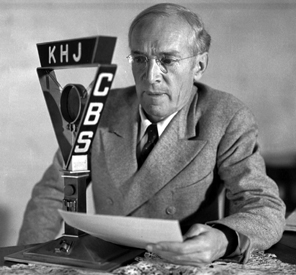
Starting here on Tuesday, Greg Mitchell will be filing daily election campaign dispatches, but with a unique twist -- the campaign took place 76 years ago. Why? In an amazing 1934 upset, ex-socialist author Upton Sinclair -- leading one of the great grassroots crusades in our history -- won the Democratic primary for governor of California in a landslide and appeared headed for victory in November. To prevent that, his opponents invented the political campaign as we know it today. It also marked Hollywood's first all-out plunge into politics and the creation of the first "attack ads" on the screen -- thanks to Irving Thalberg at MGM.
Mitchell calls it "The Campaign of the Century" (the title of his award-winning book, just published in a new edition), and the political and economic parallels to 2010 are profound. His daily reports for HuffPost will match the same date in 1934, as one of the dirtiest, most influential -- and most entertaining -- campaigns reached its riotous (literally) final days. Along the way we'll hear from many other famous figures involved in the race, from FDR to Dorothy Parker. Today, Mitchell kicks it off with an overview, below.
****
In the autumn of 1934, Upton Sinclair was one of the most famous authors in America and around the world. Today he is best known -- in many cases, only known -- as the "muckraking" author of the novel The Jungle. A few years ago, with the release of the movie There Will Be Blood, which was based on Sinclair's novel Oil!, he enjoyed a bit of a revival, but his name is still often confused with a noted contemporary, Sinclair Lewis.
Yet Upton Sinclair succeeded where greater writers, such as Norman Mailer and Gore Vidal, failed -- he nearly got elected to high office and, even in losing, had a profound effect on an American president and the future of politics in America.
"I'd like to see how a man looks who's given up his typewriter for the microphone," novelist John Dos Passos wrote Sinclair on October 1, 1934, requesting a meeting in Pasadena. Just five weeks earlier, having switched his party affiliation from Socialist, Sinclair had swept the Democratic primary in a landslide, leading the incredible EPIC (End Poverty in California) movement. Theodore Dreiser, writing in Esquire, called it "the most impressive political phenomenon America has yet produced."
H.L. Mencken, the candidate's friend and sparring partner, also covered the campaign, announcing, "Upton Sinclair has been swallowing quack cures for all the sorrows of mankind since the turn of the century, is at it again in California, and on such a scale that the whole country is attracted by the spectacle." From Italy, Ezra Pound took a break from hailing Mussolini to wire Sinclair: "Congrats on nomination. Now beat the bank buzzards and get elected."
While there have been politicians who were extraordinary writers -- think of Jefferson and Lincoln -- there are few examples of exceptional writers winning public office, at least in America. The Sinclair race reveals a good reason why, as he was "licked...by his own typewriter," acerbic newspaper columnist Westbrook Pegler put it, referring to how the candidate's foes highlighted (usually out of context) his old "muckraking" writings. But they had a big assist from the Hollywood moguls and the invention of new media techniques. (You can watch Thalberg's first attack ads for the screen here.)
Before it was over, Heywood Broun would call the California race the dirtiest in U.S. history. No institution dishonored itself quite like the California press, dominated by the Los Angeles Times, San Francisco Chronicle and the Hearst papers. But more than that, the modern political campaign was born, dominated for the first time by political consultants, advertising experts, attack ads on the screen, Hollywood antics, and all the rest.
The 1934 race, in short, showed candidates the way from the smoke-filled room to Madison Avenue, from the party boss to the "spin doctor." But the campaign also moved FDR and the New Deal of the left, and created in California the liberal Democratic party -- and "left-leaning" Hollywood -- that we see today.
Mencken didn't get his wish: "It is always amusing to see a utopian in office." But how the 1934 campaign played out in its final weeks forever changed politics, and America.
WATCH for the first daily report on the 1934 campaign on Tuesday--for October 19, 1934.
A new edition of Mitchell's book on the 1934 race, The Campaign of the Century, winner of the Goldsmith Book Prize, has just been published. He writes the popular Media Fix blog for The Nation. His other books include Tricky Dick and the Pink Lady and, with Robert Jay Lifton, Hiroshima in America. Contact him, aptly, at: epic1934@aol.com.
